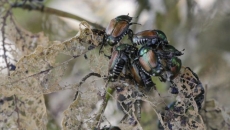A major provincial park expansion will create a protection zone of almost 2,000 square kilometres for caribou and other species in northeastern British Columbia.
The Ministry of Environment says in a statement that the addition to the Klinse-za Park will make it the largest provincial park established in the province in a decade.
The park addition is the result of a partnership in 2020 between the province and the Saulteau and West Moberly First Nations, where they agreed to help stabilize and protect the threatened southern mountain caribou.
Klinse-za Park is located just west of Chetwynd, B.C., almost 1,100 kilometres north of Vancouver.
The province says the number of caribou in B.C. fell by more than 55 per cent in the last century, mostly due to human-caused habitat disturbance, and there are fewer than 4,000 of the southern mountain species left.
The expanded park will also protect other at-risk species, such as fishers, bull trout, grizzly and wolverines, as well as sacred cultural sites for Treaty 8 First Nations in the area.
"The teachings were to leave no trace nor impact as you pass through the lands," Chief Roland Willson of West Moberly First Nations said in a statement. "Times have changed and others have come seeking natural resources for economic development: forestry, oil and gas, large-scale hydroelectric, mining, and so on. They leave a much different footprint."
The federal government has provided $46 million toward compensating industries and tenure holders affected by the park expansion, in addition to another $10 million to boost an economic diversification trust locally.






